Pelosi Wants Law Allowing Indictment of Presidents
A wrongheaded solution for a legitimate problem.
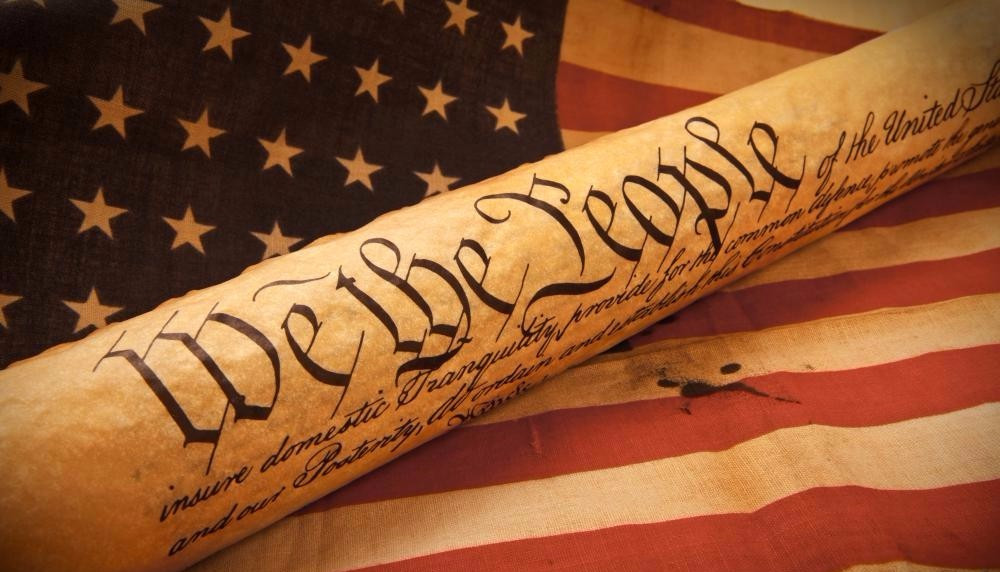
The Speaker of the House thinks sitting Presidents should be indicatable by their own Justice Department. She’s wrong in a number of ways.
In an exclusive interview with NPR, House Speaker Nancy Pelosi says she has not changed her mind on pursuing impeachment but is ready to change the law to restrain presidential power and make it clear that a sitting president can, in fact, be indicted.
“I do think that we will have to pass some laws that will have clarity for future presidents. [A] president should be indicted, if he’s committed a wrongdoing — any president. There is nothing anyplace that says the president should not be indicted,” Pelosi told All Things Considered host Ari Shapiro and NPR congressional correspondent Susan Davis on Friday.
“That’s something cooked up by the president’s lawyers. That’s what that is. But so that people will feel ‘OK, well, if he — if he does something wrong, [he] should be able to be indicted.'”
The California Democrat said that while it is Justice Department protocol not to pursue any charges against an incumbent — the reason former special counsel Robert Mueller said he couldn’t charge President Trump with a crime no matter the outcome of his report — that should be changed.
“The Founders could never suspect that a president would be so abusive of the Constitution of the United States, that the separation of powers would be irrelevant to him and that he would continue, any president would continue, to withhold facts from the Congress, which are part of the constitutional right of inquiry,” Pelosi said.
I agree that Presidents should not be above the law and that the Framers likely never imagined a President so brazenly willing to flout the norms as the current occupant of the Oval Office. But the Constitution provides a remedy that’s already within Pelosi’s power: impeachment.
To be sure, impeachment is hard. Then again, it’s designed to be. And, yes, it’s even more problematic in today’s environment, where Senators from the President’s party are extremely unlikely to vote to remove him even if he is impeached by the House.
But it’s long been considered obvious that the Constitution protects the President from criminal indictment while in office. A panel of top legal scholars debating this topic in 1997, during the Lewinski affair, were all but unanimous on that score.
It seemed obvious to me at the time, too, and I was an ardent critic of President Clinton who supported his impeachment* and removal. Indeed, I went further and thought it was absurd that a sitting President should be subject to a civil suit for matters that took place while he was a private citizen, given the obvious distractions and potential for mischief. The Supreme Court disagreed, 9-0. I nonetheless feel vindicated by events.
This near-consensus remains. Lawrence Tribe makes an interesting case for the minority viewpoint, arguing that we shouldn’t have to wait for impeachment if, say, a President were to shoot someone on the street and that it would be absurd to make him immune for prosecution in cases where he obtained the office by committing crimes. But shooting someone in the streets would typically be a state-level crime, and even Tribe acknowledges that we can’t have the President held hostage by every glory-seeking prosecutor in the land. And a criminal conspiracy to obtain the Presidency is surely the sort of thing impeachment is precisely designed to address.
To the extent that the President’s protection from prosecution stems from the Constitution rather that merely DOJ policy, Congress can’t overturn it by mere statute. And, of course, this would be a mere political stunt, anyway, as Pelosi is surely aware that it has no chance of passing the Senate, much less overcome the obvious veto.
Beyond the Constitutional argument is the practical one that the Justice Department answers to the President. It would simply be untenable for the Attorney General or other federal prosecutors to try a case against their boss. Indeed, it’s why we’ve had various special counsel and independent prosecutor statutes over the years.
_______________
*I’m on the record that President Trump has committed multiple impeachable offenses but agreeing with Pelosi that, since he won’t be removed by the Senate, it’s better not to begin impeachment proceedings.

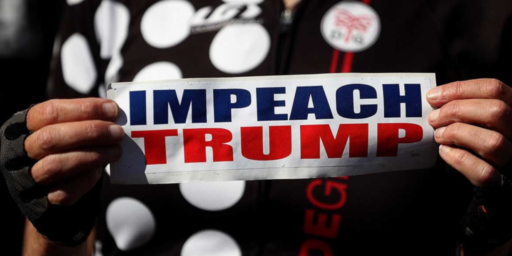
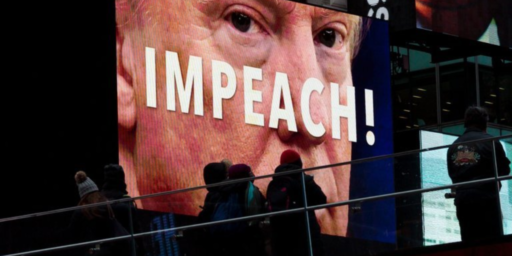
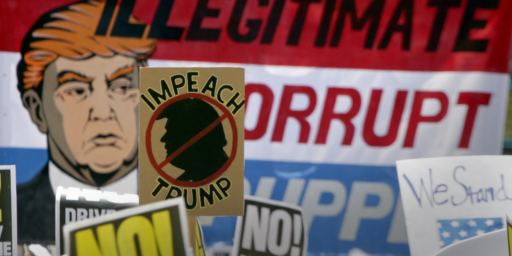
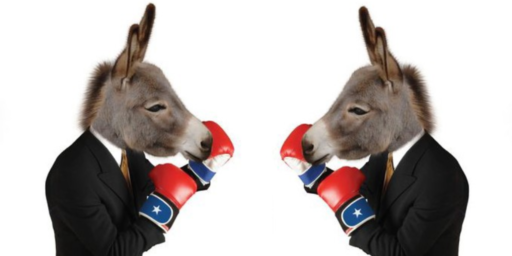
I just can’t agree. Impeachment is a political process, whether intended to be or not. We’ve seen as much, both from its use and its non-use. As such, it is an ineffective tool to curb executive misdeeds. An apolitical remedy is needed.
The “distraction” argument is not proven out in practice either. What’s more distracting – a political impeachment circus involving both the House and Senate along with the executive, or a criminal investigation by proper independent authorities? I’d say the former.
Removal from office is also not an effective consequence for illegal activities. It really does nothing to satisfy the three aims of legal penalty for crimes – rehabilitation, retribution and deterrence.
With respect to the legality of such a statute, I very much question the notion that the Constitution forbids prosecution of a president in any event. The DOJ memo seems pretty unpersuasive to me. At least a judge would have to decide about constitutional issues though.
To the extent that the argument that a sitting President cannot be indicted is based in the Constitution, a Federal law to the contrary (assuming it ever became law) would arguably be unconstitutional if the courts agreed with the conclusion of the Justice Department, reached both during the Nixon and Clinton scandals, that the basis for the idea that a sitting President can’t be indicted while in office is based on the Constitution itself.
@Pylon:
Your argument is flawed because impeachment by the House and “trial” in the Senate are not the same as a criminal trial in Federal or state court. The rules are entirely different — indeed, there are no set rules for either procedure — and the Constitution makes clear that conviction by the Senate does not establish a precedent for future criminal proceedings. That means that a President could be impeached by the House, removed by the Senate, and yet ultimately acquitted in a subsequent criminal trial. All on the same charges.
That’s because impeachment and removal are indeed political.
The problem is that given the clearly high bar for impeachment and removal, especially in an era of polarized politics (an era I do not see ending any time soon) and the lack of a shared media environment, I am not sure (apart from video of an obvious crime–and I mean super obvious), I am not sure what could result in impeachment and removal.
We also don’t have any stomach for prosecuting former presidents (see, e.g., Nixon).
Does anyone think Individual 1 is going to be prosecuted for campaign finance violations once he is out of office?
So, are we not a point at which presidents are essentially above the law as a practical matter?
Shorter Joyner: we can’t punish this president for committing crimes, because then we’d have to punish every president who committed crimes.
Kind of like how glory-seeking prosecutors are constantly indicting every single member of the House and Senate. Oh wait, they’re not, because this is a complete bullshit thing you made up to justify your moral cowardice.
@Stormy Dragon:
Hear, hear!
Here’s what James and Doug don’t seem to get: rules are like walls. Once someone has found a hole in the wall, the rule no longer matters. Trump has found all the holes. So falling back on, ‘well, we got this wall,’ is just can-kicking and avoidance.
A way has been found around the rules. The system meant to protect us has failed. Impeachment effectively no longer exists as a remedy. We are unprotected from a tyrant. We are unprotected from a reckless fool. Unprotected from a traitor.
The system does not work.
Take that on-board, @James and @Doug, and tell us what better way there is to protect the rule of law. Because if you just point back to the walls that are already flat on the ground, I don’t anyone is going to take you seriously.
@Stormy Dragon:
I’m not sure that I buy that line of reasoning. Any particular state might be tempted to prosecute its own representatives, but then again those were the people chosen by the state. That’s an unlikely path to glory. But with the president, I think the danger would come from those states that voted against him. So certainly some potential for glory.
@michael reynolds:
Agreed. And if we take a step back, we see that the Legislature broke before this, pushing ever more power and responsibility on to the Executive. I guess it was inevitable that the Executive would itself fail, and so push us into a seeming death spiral. Does anyone really see us unwinding this mess?
Impeachment is only possible if Senators are willing to act in the interests of the country over party. Those days are past. The combination of tribalism and cult of personality makes Trump immune.
Steve
@michael reynolds:
What, exactly, do you realistically think a failed impeachment effort (and by failed I mean one that does not result in removal) is going to accomplish? Do you think Trump’s going to care? That his supporters will? That most Americans — who continue to tell pollsters that they don’t want to see impeachment happen — will?
I agree that the Rule of Law and other such things are important but a failed attempt to remove the President right before an election doesn’t seem to me like it’s going to improve the situation.
@Stormy Dragon: The incentives relative to a President versus Congress in the case of prosecution with political aims are completely and utterly different, so this is rhetorical idiocy.
However, your system rather clearly has a serious weakness that needs rectification. Doubtless something like an independent prosecutor’s office separate from the Executive but with guard rails against political prosecution.
The unhinged revolutionary rhetoric (oddly familiar since many of the same were frothy at the mouth about Bush, who was merely a banal adversary) is rather overdone.
@Doug Mataconis:
Impeachment in open hearings puts the case to the American people. That has not yet been done outside of media that you and I consume in mass quantities, but most people don’t.
Law enforcement does not typically insist on a 100% certainty of conviction. They can’t because no one can be sure of a jury. If 100% certainty was the threshold we’d never charge a mobster.
If you don’t present the case, and level the charges, the precedent we’re setting is far more damaging than the indifference of a cynical Mitch McConnell. Lay out the case, show the obstruction, tie #MoscowMitch to it directly. Then hold an election.
It’s important to remember where that policy came from — it was crafted to allow the indictment of Spiro Agnew. The VP can also only be removed from office by impeachment, which leads to the same arguments, and the DOJ memo was looking at the other practical limitations (distraction of the procedure, etc), and said that they don’t apply to the VP because it’s a useless role.
It was less “clearly the President cannot be indicted” and more “for the sake of argument, the President cannot be indicted because X, Y and Z, but none of those apply to the VP.”
Also, it remained controversial, and has never even been tested on the VP side. Agnew resigned moments before pleading guilty, with no indictment being delivered.
——
The Rachel Maddow “Bagman” podcast was great by the way, all about Agnew.
I recently read Bruce Gibney’s The Nonsense Factory. He’s not convincing in detail, but his overall point, that our legal system is a mess, seems beyond contention. One of his main arguments is that no lawyer can tell you what the law says. He has had to deal with lawyers regularly, and none can tell him what laws mean without quibbles and evasions. Sure seems to be the case here.
I’m unable to download more than the five page forward from the embedded link. There appear to have been six papers:
Amar and Kart – Infer from the Constitution immunity from federal and state prosecution.
Bybee – Constitution and policy considerations say prez and all civil officers immune.
Howe – No immunity in Constitution but policy arguments favor immunity as a matter of federal law. (Inferred from federal law or should be addressed by federal law? Unclear in forward.)
Freedman – Not immune, and sees no policy need for immunity.
Eastland – No immunity, but as a practical matter DOJ works for the prez.
Chemerinsky – Addressed only civil matters and found no immunity. (The forward author infers the same arguments would lead Chemerinsky to conclude no criminal immunity.)
I’m failing to see all but unanimous agreement there. In fact, I see scattershot, no agreement at all on what the law is. Freedman and Chemirinsky see no immunity. Howe and Eastland see policy or de facto immunity, not Constitutional, leaving room for Pelosi’s legislation. Further, it was reported that the author of the DOJ opinion called an aide to the then AG and asked how the AG wanted the opinion to come out.
To me, it seems obvious that the president must not be above the law. To you, James, it seems obvious that the prez must be immune. Although it seems to me you have to torture the clear wording of the Constitution (which is what lawyers get paid to do) to find immunity, I realize my liberal biases also affect my opinion. Perhaps your conservative leanings are speaking?
@michael reynolds:
I mention Gibney above @gVOR08:. He cites figures that almost nothing criminal goes to a jury anymore. Most cases are settled by plea agreement in negotiation between a prosecutor with the resources of the state including the police and a defendant with a public defender with a hundred other cases. It seem the right to trial by a jury of your peers mostly applies to people who can afford it.
@Kit:
Roll it back further and the constitution, which so many equate with divine writ, failed rather spectacularly in 1860. Civil war is not the sign of a well-functioning system of government. And of course the constitution failed people of color and women, so until quite recently the constitution could only be said to work for white males.
Don’t get me wrong, our constitution is better than most such attempts. It embodies some glorious ideas. But it is showing its age. It is failing. It still gives disproportionate power to small states which (shock!) just happen to be either unrepentant ex-confederates, or all white farming enclaves. And it is quite clearly incapable of dealing with bad actors in the White House.
@michael reynolds:
Isn’t that essentially what the Democrats are doing now via the Judiciary Committee, as well as proceedings on other grounds in the Intelligence Committee and the House Oversight Committee?
@Doug Mataconis:
It really isn’t grounded in the Constitution though. It’s grounded in a practical determination that an indictment, and having to defend against said indictment, would derail the functioning of government to such an extent that it can’t be permitted.
All that Article 1 really stipulates regarding the indictment of a sitting president is that the impeachment / conviction / removal from office process doesn’t implicate double jeopardy for the purposes of normal criminal process for the same offenses. It makes no stipulation regarding either the timing or the mutual exclusivity of those processes.
I’ll agree that the courts, desperately, need to weigh in on this issue, if for no other reason than to establish a definitive constitutional position. History is informative here, in that Agnew was investigated and was in process to be indicted when he agreed to plead guilty to a single charge of tax evasion to end that process and subsequently resigned. Had he not so agreed, he absolutely would have been indicted.
The key point, however, is that nothing in Article 1 debars either the criminal investigation or or the indictment of a sitting impeachable official.
You are overlooking that in an actual trial in the Senate, the President has the right to answer the one-sided charges and mount a defense before the American people. The question arises as to whether the Democrats with impeachment decision authority believe that their arguments can withstand rebuttal.
Otherwise, you have the accusations, the rebuttal, then the election. The electorate may choose to hold the “prosecutors” accountable.
@JKB:
Trump doesn’t rebut, he lies and obstructs justice.
I have absolutely no fear of a Trump rebuttal. No more than I fear your latest dishonest and absurd defense of your criminal cult leader.
@HarvardLaw92: Heeeyyyy! Welcome back! Been a while since I’ve seen your username, you were missed!
@Doug Mataconis:
No, it’s not the same thing at all. Everyone knows Pelosi is blocking Nadler.
An impeachment committee would be a select committee, so we might actually be able to assign some of the more coherent Representatives. And there would be committee counsel to handle most of the questioning, as was the case for Watergate. The obstruction would be clearly obstruction of an impeachment inquiry. The watching audience would quickly become frustrated as it became apparent that Trump and his people would refuse to co-operate, obstruct and perjure themselves.
After that #MoscowMitch is perfectly free to throw himself and his fellow bootlicks onto the pyre and burn along with their cult leader. I want Mitch and the GOP to be clearly, unmistakably on the side of corruption.
@HarvardLaw92:
We weigh risks. The risk of an ambitious, partisan state DA charging the president, versus the risk that the voters are stupid enough to put the head of a crime family in the White House with access to the pardon power, the ability to corrupt the Justice Department, and with control of a couple thousand nuclear warheads.
So long as B was unlikely, it argued for limits on prosecution. But 46% of American voters opted to do the stupid and prove incontrovertibly that the greater danger is in limiting prosecutions.
@JKB: “the President has the right to answer the one-sided charges and mount a defense before the American people.”
Remember how well that went for Philip Francis Queeg? Trump will be screaming about someone stealing his strawberries after about ten minutes of questioning.
I will posit a contrarian view: since the Constitution allows for the removal of a president for “high crimes and misdemeanors”, would not the preceding action require a conviction? Meaning the Constitution seems to imply that a charge and conviction are required for an impeachment. In fact even upon removal from Office after an impeachment proceeding, without a criminal conviction, an individual has legally not been found guilty of high crimes and misdemeanors. See the history of Rep. Hastings.
I wonder if, during the time of the Nixon impeachment process, the Senate had been controlled by Republicans, would the House have still moved forward with the impeachment proceedings…of course, back then, there were actual Republicans who were honest enough to admit that Nixon committed impeachable offenses…a pity such honest Republicans don’t exist today…
@michael reynolds:
That’s the pro-impeachment argument right there, michael. Billboard simple language that lays out a path forward that acknowledges the complexities – the importance of taking a legal stand against a lawless president, the undeniable reality of a Republican Senate in the thrall of a corrupt administration, the critical connection to the entire GOP that would destroy the country in the name of party unity, then finally the call for the people to vote for an end to all of it – lawlessness, corruption and destruction.
@michael reynolds:
Correct, but the protection against an ambitious, partisan DA is the criminal process itself. Hypothetically anyway, going from there to obtaining a conviction would still require the production of evidence sufficient to establish guilt beyond a reasonable doubt.
There was a time where I believed that pursuing impeachment was a fool’s errand, since the Senate would never, ever vote to convict, but I’ve come to the conclusion of late that simply engaging in the process of investigating, in and of itself, has merit. Between the potential products of such an investigation and the optics of Trump doing everything in his power to thwart it, there really is no down side for us – particularly if the House returns articles of impeachment predicated on hard evidence that the Senate then chooses to ignore for partisan reasons. The campaign ads basically write themselves.
@Raoul:
Impeachment is a political process, not a criminal process. It mimics criminal process, to be certain, in that the House returns “charges” (articles of impeachment) and the Senate conducts a trial (it’s actually structured as a trial) upon which it either “convicts” or acquits. Within that scenario, “high crimes and misdemeanors” means “pretty much whatever the House wants to charge him with”. Theoretically, they could impeach the president for having a bad spray tan …
@Jax:
Thank you 🙂
But the House members will have to answer to their constituents for any “charge” they make. Where we stand now, is those Democrats from secure districts need impeachment, those from competitive districts or that we switched as of 2018 don’t want to go near it. And it is the latter on whom the control of the House depends after 2020.
As impeachment proceedings go forward, and more and more crimes by this president are exposed, the latter of those Democrats will have plenty of evidence to show to their constituents about why they are pursuing impeachment…
The image at the top of the post looks like a baseball bat with “We The People” written on it.
I know it’s parchment, but the perspective makes it look like a baseball bat which is fairly provocative.
@wr: You do get that in a novel the author gets to determine what the characters will say and how they will react, right? Now before we turn to go to the “authenticity” debate, remember that reader response theory allows that readers assign authenticity whenever the outcome in the novel matches what they believe real life looks like.
It’s possible that Trump would simply stonewall and decide not to answer the charges or that his handlers would control the narrative enough to protect him from turning into a real life replica of the fictional character Captain Queeg.
Now, having said all of that, if you can get the House to go along and really want to have several months of dog and pony show with Trump sucking the air out of the room, fly at it. I think it would be better to figure out how to circle all the Democrat wagons so that you don’t have 60-some thousand voters in 3 key states taking “principled stands” against your candidate, but what would I know? I’m just nutha ignint cracker.
ETA: Subsequently saw HL92’s argument (welcome back BTW) and he makes good points. I’m not as optimistic about the intelligence/wisdom of the electorate as he is, though.
@Doug Mataconis: With respect I fail to see how what you say makes my argument flawed. Indeed, it is because impeachment is political that criminal process has to be an option. NOt an alternative, but an additional, apolitical, potential outcome.
I do think that no new law is needed, because the Constitution neither states nor implies a prohibition against indictment (or other process) against a sitting president. I find it amusing that Black Letter originalists support that idea, which requires a ton of inferential interpretation.
@Pylon: Don’t worry about the Black Letter originalists; when they find a President who they would like to be able to try in court, they’ll discover that “the Constitution says nothing at all” about Presidents being immune from prosecution.
@Just nutha ignint cracker: “You do get that in a novel the author gets to determine what the characters will say and how they will react, right?”
Um, yeah.
I also know that Trump’s lawyers would not let him testify to Mueller because they believed he would perjure himself. And that in the past — in his pre-political life — he depositions were frequently disastrous for him.
@HarvardLaw92: True. As I’ve remarked to some GOP commentators on other online forums, a President could be impeached for spitting on the sidewalk, to say nothing of spitting on the Constitution.